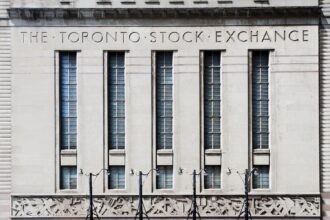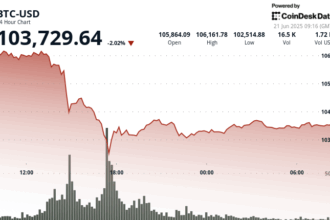Potential $95K Bitcoin Correction Looms as US Debt Soars and Housing Market Weakens
Key Takeaways
- Rising US debt and housing market stress potentially signal a sharp BTC correction toward $95,000.
- Bitcoin’s price closely correlates with macroeconomic trends, including Fed policy and institutional flows.
US Debt Reaches Historic High amid Potential Crisis
The United States’ gross national debt jumped by $367 billion on Monday, hitting an all-time high of $36.6 trillion. The surge followed President Donald Trump’s approval of the “One Big Beautiful Bill,” raising the debt ceiling by $5 trillion on Friday. Some analysts are speculating whether this could trigger a Bitcoin (BTC) price correction down to $95,000.
Housing Market Signals Growing Concern
Analysts, including Kurt S. Altrichter, founder of Ivory Hill Wealth and CRPS, have raised red flags about the US housing market. A significant indicator typically surging before economic downturns, housing inventory, has reached “alarming levels” according to Altrichter.
The inventory of new single-family homes has increased to levels approaching 10 months’ worth of supply. “This has only occurred during or right before recessions,” Altrichter stated. He noted while high interest rates contribute to the weakness, the primary concern is “demand evaporation.”
If the historical link between housing oversupply and broader economic decline holds, the impact could weigh on risk-on assets, including Bitcoin. Historically, even in the long term, investors tend towards risk aversion during such periods.
Broadening Monetary Policy Debate
Analyst Jack Mallers, co-founder and CEO of Strike, indicated on X that the Treasury’s “only viable option” is to expand the monetary base – effectively injecting new money into the economy. Mallers argued this doggedness in avoiding a debt default creates an environment “ideal for a Bitcoin rally.”
Fed Policy Disagreements: Risk Aversion vs. Potential Rally
A counter-narrative exists. While some see the Bitcoin breakout above $112,100 and broader stock market rally as driven by Fed expectations, others worry about the possibility of a recession.
Speculation around President Trump’s potential effort to replace Fed Chair Jerome Powell is growing. If successful, this could signal more dovish monetary policy, including potential interest rate cuts.
Despite strong net inflows into Bitcoin ETFs, BTC remains closely tied to the broader equity markets, with a correlation coefficient against the S&P 500 standing at 68%. Ongoing US import tariffs also represent another risk factor, potentially impacting corporate earnings (especially in the tech sector).
Debating the Future: Correction or Rally?
The escalating debate centers on whether the current pressures will lead to a Bitcoin correction or another leg-up. Proponents of the correction scenario argue that economic distress always favors safe havens like cash and bonds over riskier assets like Bitcoin.
However, the long-term outlook for alternative assets could remain positive. Notably, Jack Mallers at Strike suggested “a new all-time high for Bitcoin this year” remains plausible despite current concerns. Yet, for now, persistent macroeconomic uncertainty, particularly around AI-driven tech stocks, seems to be the primary source of apprehension for traders.
This article is for general information purposes and is not intended to be and should not be taken as legal or investment advice. The views, thoughts, and opinions expressed here are the author’s alone and do not necessarily reflect or represent the views and opinions of Cointelegraph.












